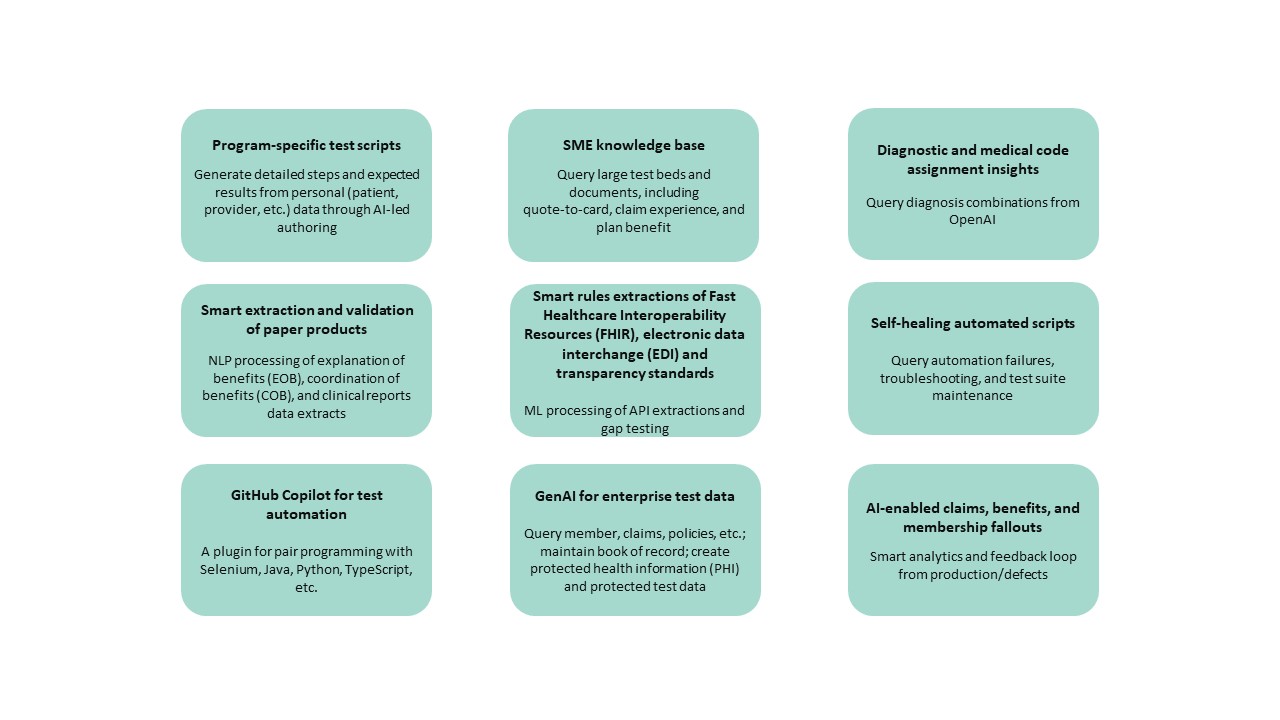The healthcare industry is currently witnessing groundbreaking digital transformation. Payors are focused on enhancing patient experience and access to care, further expanded by the proliferation of personal devices and wearables. According to recent research, the remote patient monitoring market in the United States was valued at US $13.40 billion in 2022 and is expected to reach US $25.28 billion by 2028, growing at a CAGR of 11.16%. Rising healthcare costs and recognized benefits from data analytics are driving the need for a digital revolution led by artificial intelligence (AI) within payor and provider organizations.
As the digital health technology landscape evolves, quality engineers are facing numerous challenges related to data management, compliance, interoperability, and complex integrations. However, the emergence of AI is poised to enhance these processes significantly, enabling teams to execute tests quickly and intelligently, improving overall efficiency, while reducing quality engineering (QE) costs.
Healthcare interoperability underscores the importance of ensuring data security, accuracy, completeness, and consistency across systems. There are numerous compliance challenges, such as ensuring price transparency, patient data accessibility, and integration with electronic health records (EHRs) and billing systems. These introduce additional complexities that demand subject matter expertise, testing accuracy, and comprehensive test coverage.
To ensure future growth and success, healthcare payors must prioritize Medicare star ratings and net promoter scores (NPS) while adopting cloud-based customer relationship management (CRM) systems. Using innovative solutions can help validate systems beyond their functional features.
Building Blocks of Innovation
Quality engineers have a key role in developing predictive models that identify and proactively mitigate potential risks in digital health products. They streamline compliance processes through intelligent information extraction and rigorous regulatory validations. AI-powered chat prompts and pair programming assistants can improve test coverage and accessibility to health knowledge. Analyzing production claim data, historical defects, and test suites can strengthen quality risk analysis while providing predictive insights and optimizing testing efforts.
The figure below depicts real-time generative AI (Gen AI) solution use cases for healthcare. These solutions aim to enhance quality and reliability through AI-led testing. 
Gen AI Applicability in Healthcare QE
Gen AI holds significant potential in healthcare QE, offering several applications for efficiency and effectiveness:
- Analysis of cost-effectiveness: By streamlining administrative processes, GenAI can eliminate unnecessary paperwork and bureaucratic inefficiencies, making care more cost-effective.
- Test authoring disease prediction and prevention: Disease prediction models can stratify individuals based on risk groups, genetic predispositions, and behavioral analysis. Natural language processing (NLP) algorithms with GenAI can help generate scenario combinations and identify patterns using patient information.
- Enhanced test coverage of precertification decision support: AI and machine learning (ML) can bolster the precertification decision support system by comparing complex and historical cases, broadening perspectives through virtual second opinions.
- Production-like adjudicated claims in a low environment: Complex adjudication systems involve numerous compliance rules, API calls, and cloud as well as platform integrations. An intelligent analysis tool can help scan plan benefit combinations, examine API rules, and generate test data scenarios.
- Augmenting test design and health workflow automation: Automation testers can quickly develop key value stream processes and execute repetitive test runs to manage growing regression test beds and complexities in systems integration.
- Reduced effort and increased coverage on compliance reports: Organizations can benefit from smart solutions that automatically identify appropriate reports/files, extract relevant information, and provide necessary input data for testing.
Gen AI in healthcare QE not only offers several benefits but also delivers substantial value to clients:
- 40-50% reduction in test plan and execution effort
- 30-40% improvement in test coverage
- 30-40% enhancement in business efficiency
Conclusion
To fully reap the benefits of AI-led QE, payors and providers must identify an AI-first solution partner capable of seamlessly transforming their processes. While use cases show promise, AI is not infallible. Therefore, partners must support organizations in developing inclusive, unbiased, and responsible models that can save costs and boost productivity.












Thank you so much for sharing all these insights from future readiness perspective.
Thanks Praveen
Thank you Amit! Very Insightful and thought provoking. In light of the recent ban put by US house of representatives on use of copilot by its staff, are there any apprehensions of slowdown in adoption of AI, specifically with the US customers?
Thanks Saurabh, as per research there are segments like Insurance, healthcare and Banking who are compliance heavy adoptions are slowly increasing and they are coming up with strong responsible AI governance to manage the adoption.
17% of GDP of USA is spent on Health Care, where as only 3.5 % of GDP is spent on Defence, despite the fact that USA being the largest Defence spender of the world. So GenAI is going to play a major role in optimising the opverburderned health care cost in USA.
Thanks Amit for such a good article covering meticulously Tech, Domain and Futuristic approach of GenAI in Health Care.
Thanks.
Thanks Santosujit for reading it and finding relevant.
Great insights into the ongoing trends in the industry and how AI becomes pivotal to next gen QE.
Thanks Mohanish, much appreciated.
Very nicely depicted for the evolving trend of technology.
Well-written techno domain view on Gen AI application in Heathcare. Very insightful. Thanks, Amit.
Thanks Ravi for your acknowledgement and appreciate your support in this journey too
Thank you, Amit! Very Informative.
Thanks Subhajit
A well written blog on Quality Engineering use cases for Healthcare with AI.